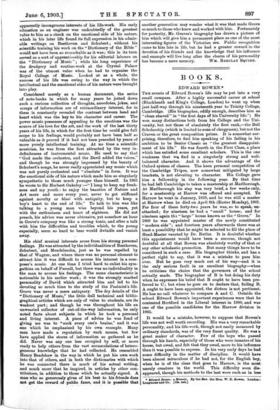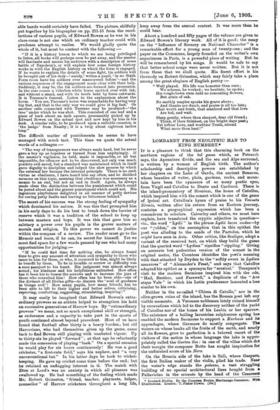BOOKS.
EDWARD BOWEN.*
THE events of Edward Bowen's life may be put into a very small compass. After a highly successful career at school (Blackheath and King's College, London) he went up when just half-way through his nineteenth year to Trinity College, Cambridge. (His biographer, oddly enough, describes him as " clean shaved" in " the first days of his University life.") He won many distinctions both from his College and the Uni- versity, but not those of absolutely the first rank,—the Bell Scholarship (which is limited to sons of clergymen), but not the Craven or the great composition prizes. It is somewhat sur- prising, therefore, to find him speaking of his failing in his ambition to be Senior Classic as " the greatest disappoint- ment of his life." He was fourth in the First Class, a place which has satisfied some excellent scholars. This is the one weakness that we, find in a singularly strong and well- balanced character. And it shows the advantage of the Oxford system of classes. The keen personal competition of the Cambridge Tripos, now somewhat mitigated by large brackets, is not elevating to character. His College gave him a fellowship in the following year. By that .time he had left Cambridge to taken a mastership at Marlborough. At Marlborough his stay was very brief, a few weeks only, for a mastership at Harrow was offered and accepted. To Harrow he went in January, 1859, and he was still a master at Harrow when be died on April 8th (Easter Monday), 1901. For four of these forty-two years he was, so to speak, un- attached ; for nineteen he had a " small " house; and for nineteen again the " large " house known as the " Grove." In 1869 he was appointed master of the newly constituted " modern side"; and fourteen years afterwards there was at least a possibility that he might be selected to fill the place of Head-Master vacated by Dr. Butler. It is doubtful whether this appointment would have been a success, though not doubtful at all that Bowen was absolutely worthy of that or any other scholastic promotion. But many things have to be considered in such a case. His biographer thinks, and has a perfect right to say, that it was a mistake to pass him over. But he goes very much out of his way—and it is the only serious fault in an excellent biography—when he criticises the choice that the governors of the school actually made. The biographer of B is but doing his duty when he expresses his belief that B ought to have been pre- ferred to C ; but when he goes on to declare that, failing B, A ought to have been appointed, the dictum is not pertinent. He has no call whatever to compare A and C. Outside the school Edward Bowen's important experiences were that he contested Hertford in the Liberal interest in 1880, and was one of the possible candidates for the Harrow division in 1885.
It would be a mistake, however, to suppose that Bowen's life was not well worth recording. His was a very remarkable personality, and his life-work, though not easily measured by ordinary standards, was of the very finest quality. He was a great maker of character. Few of the boys who passed through his hands, especially of those who were inmates of his house, but owed, and felt that they owed, more to his influence than it was possible to express. In his very early days he had some difficulty in the matter of discipline. It would have been almost miraculous if he had not, for the English boy, when he is of the class that goes to Harrow, is the most unruly creature in the world. This difficulty soon dis- appeared, though his methods to the last were such as in lees
• Edward Bowes: a Memoir. By the Rey. the Hon. W. E. Bowen. London Longman. and Co. [M. net.]
able hands would certainly have failed. The picture, skilfully put together by his biographer on pp. 211-15 from the recol- lections of various pupils, of Edward Bowen as he was in his class-room is not one which an ordinary teacher could with prudence attempt to realise. We would gladly quote the whole of it, but must be content with the following :—
" If it is a history lesson to which we are being privileged to listen, all books will perhaps soon be put away, and the master will fascinate and amuse his audience with a description of some battle of Napoleon's, or will explain how some foreign history works in with the English history on which the form is engaged. If he wants to explain the details of some fight, tin soldiers will be brought out of his desk= surely,' writes a pupil, in no Sixth Form room have tin soldiers ever manoeuvred before'—and the various sequences of the engagement made clear with their help. Suddenly, it may be, the tin soldiers are formed into procession. In the rear comes a riderless white horse spotted over with ink, and without a stand, and with its hoofs bent by force outwards. It is Turenne's funeraL Listen to the explanation about the horse. You see, Turenne's horse was remarkable for having very big feet, and that is the only way we could give it big feet.' Or another relic connected with Turenne may be produced= the tree' under which he was shot. This consisted of one leaf and a piece of bark about an inch square, presumably picked up by Edward Bowen on the actual spot and now kept by him in his desk. A similar relic, to be produced upon a suitable occasion, is the hedge' from Naseby ; it is a twig about eighteen inches long."
The difficult matter of punishments he seems to have managed with much tact. This time we quote the actual words of a colleague :-
" The way of transgressors was always made hard, but he never gave a boy up as hopeless or turned from him unpityingly. If the master's vigilance, he held, made it impossible, or all but impossible, for offences not to be discovered, not only was much positive evil saved, but a standard was maintained which in itself gave dignity to discipline and helped the slow process by which the external law became the internal principle. There is no such virtue as obedience, I have heard him say often, and he disliked sermons on this topic, meaning that obedience was necessary as a means to an end, but not an end in itself. Again, he always made clear the distinction between the punishment which could be jested about and the graver punishment which could not. His ingenious playfulness delighted in all manner of petty devices for curing petty faults and leaving no bitterness behind."
The secret of his success was the strong feeling of sympathy which dominated his nature. It was this that prompted him in his early days to do his best to break down the barrier of reserve which it was a tradition of the school to keep up between masters and boys. It was this that gave him so salutary a power over his pupils in the graver matters of morals and religion. To this power we cannot do justice within the compass of a review. The reader must go to the Memoir and learn, if he can, its secret for himself. Yet we must find space for a few words penned by one who had many opportunities for judging :—
" If he could find time for nothing else, he always found time to give any amount of attention and sympathy to those who came to him for them, or who, it occurred to him, might be likely to benefit by them. To be in trouble or sorrow or difficulty was a sure passport to his heart. His judgment was almost always sound ; his kindness and his helpfulness unlimited. How often has it been his to lessen the sorrows and to increase the joys of those who consulted him ! How often has he been able—one of the divinest of all Divine gifts—to discern the soul of goodness in things evil' ! How many pupils, how many friends, has he been able to lift to their higher and better selves, criticising, reproving, comforting, suggesting, stimulating, inspiring!"
It may easily be imagined that Edward Bowen's extra- ordinary prowess as an athlete helped to strengthen his hold on successive generations of Harrow boys. By "extraordinary prowess" we mean, not so much exceptional skill or strength, as endurance and a capacity to take part in the sports of youth continued almost beyond precedent. Most of us have found that football after thirty is a heavy burden; but old Harrovians, who had themselves given up the game, came back to find Bowen still playing with unabated vigour. Up to thirty-six be played "forward" ; at that age he reluctantly made the concession of playing "back." On a special occasion he would play for six hours continuously ! He was a good cricketer, "a first-rate field," says his nephew, and "a very unconventional bat." In his latter days he took to wicket- keeping. He gave up cricket some time before the end; but be retained an unflagging interest in it. The match with Eton at Lord's was an anxiety in which all pleasure was swallowed up. He had something of the feeling which made Mr. Robert Grimston, "friend, teacher, playmate, helper, counsellor" of Harrow cricketers throughout a long life, keep away from the annual contest. It was more than he could bear.
About a hundred and fifty pages of the volume are given to
Edward Bowen's literary work. All of it is good ; the essay on the "Influence of Scenery on National Character" is a remarkable effort for a young man of twenty-one ; and the paper on the Commune, largely founded on the writer's own experiences in Paris, is a powerful piece of writing. But he will be remembered by his songs. It would be safe to say that better school songs were never written. But it is not from these that we shall quote. His finest effort is his threnody on Robert Grimston, which may fairly take a place among the great elegiacs of English poetry :- " Well played. His life was honester than ours ; We scheme, he worked ; we hesitate, he spoke;
His rough-hewn stem held no concealing flowers, But grain of oak.
No earthly umpire speaks his grave above ;
And thanks are dumb, and praise is all too late; That worth and truth, that manhood and that love Are hid, and wait.
Sleep gently, where thou sleepest, dear old friend; Think, if thou thinkest, on the bright days past ; Yet loftier Love, and worthier Truth, attend What more thou hast !"











































 Previous page
Previous page